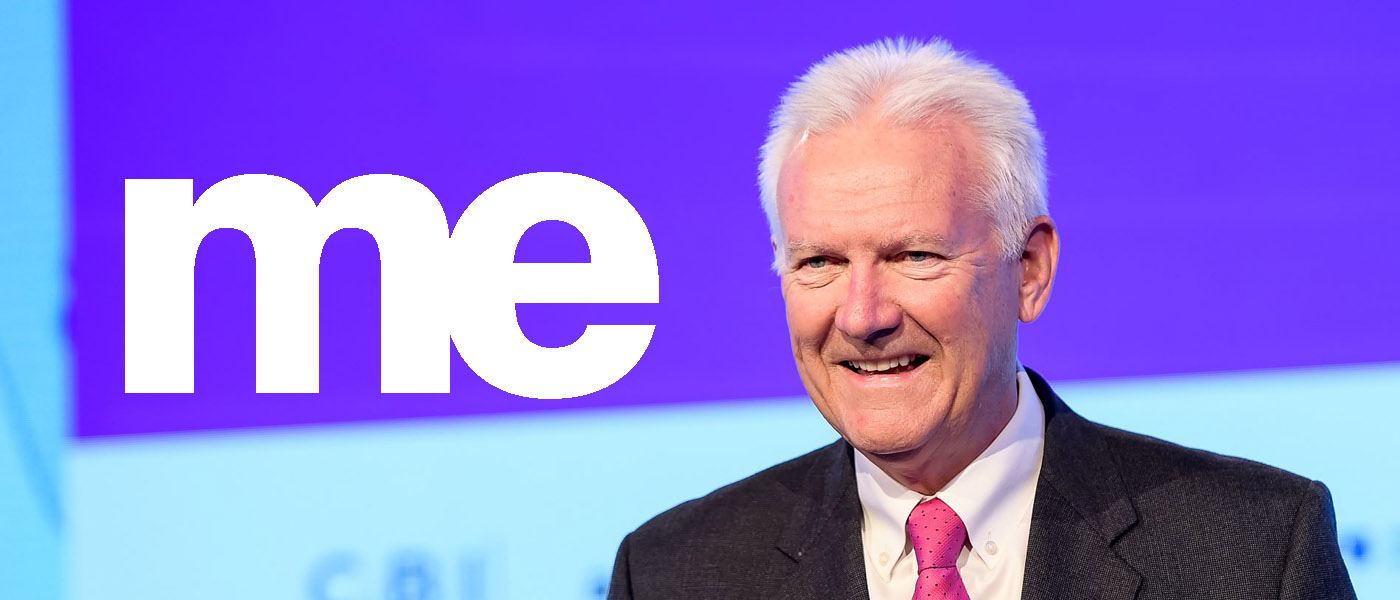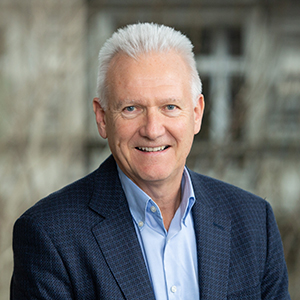
Me by Brian McBride
Brian McBride (MA 1977) has been a prominent figure in the business world for decades. Rising swiftly in the ranks from his first job selling photocopiers, straight from UofG, to the prestigious role of Amazon UK CEO, Brian’s impressive business experience has now elevated him to become President of the Confederation of British Industry (CBI), a role in which he oversees and represents almost 200,000 British businesses. We speak to Brian about his plans for the job, and look back on his long career.
What are your main goals for your two-year tenure as President of the CBI?
I think, really, just to make a difference. I hadn’t realised when I accepted the role that I’d be taking it up at such a time of economic turmoil, so there’s a lot of influencing to do now with all the political parties, trying to drive the growth agenda. I think we’re in for a very tough 18 months for individuals and businesses. The role will be exciting. It is a big challenge, but I enjoy a challenge.
You started out in business selling photocopiers; how would you describe your career journey?
There was no plan at all! I started off selling photocopiers simply because it was a better-paid job than a typical graduate trainee, back in those days. You got a company car, which sounded very exotic, and it taught me selling, which is a very good skill to have. From there, I moved into computers; quite a logical move, I think. IBM opened my eyes to a much bigger world when I went to New York, then I started to progress through senior management, so it became much more about leadership. I went from IBM to Dell, then to T-Mobile (now EE), and then to Amazon, just as e-commerce was exploding. I think a bit of it was luck. I was in the right place at the right time.
"The great Roman Stoic philosopher Seneca said that luck is where preparation meets opportunity. You need a bit of luck, but you need to be ready for it as well.
Was there a pivotal moment in your life that informed the direction of your career, or has it been a series of stepping stones?
There were two big decisions. One was going to the US with IBM. It sounds like an exciting thing to do, but my daughters were five and seven at the time; you’re uprooting your family, moving away from parents, so it was quite a big decision to make. But it was great for the family to live in another culture, and I learned a very different view of the world of business. Then the next pivotal bit was leaving IBM after ten years. I moved to a much smaller company, in trouble, and I had to fix it, which was the first time I’d ever really had to do that in my life. So that was quite a seminal moment as well.
You’ve been UK CEO of the giant Amazon. How do you feel about these huge institutions, as compared with small-to-medium enterprises, given your role is to represent all different types and levels of business?
I’m very lucky in that I have experienced the full spectrum. I’ve seen the best in start-ups, all the way through to big, big companies like Skyscanner. So I’ve seen that cycle of growth, as well as the mega corporations of the Amazons and the IBMs, and it’s not a right or wrong or better, you need them all.
What, if anything, do you think your being from Glasgow has contributed to your success in business?
Clearly, we have a great industrial heritage, we’ve exported a lot of engineers and people like that. Coming from Glasgow, I certainly went into the world of work with lots of confidence. Not arrogance, but just that I believed I was as good as anyone else. I’ve never been in awe of people more senior, or in a better position than me.
What do you plan to do once your presidency is over in 2024?
I think when you get to my stage in life it’s more about that 'putting back in' again. You’re not trying to get your next paid job, so I can apply myself more to the not-for-profit things. But I’d also like to carve out a little bit of time for some leisure as well. I’ve got four grandkids, I’m just fortunate and blessed to have them, and I want to spend time with them when I’m fit and healthy, so I’m looking forward to that.
UofG memories
I was a bit of a minimalist as a student. I was bright, I won the maths prize, was good at English, so I had the basics, but what I found is that I would do just enough to get an essay done. I wasn’t great at attending lectures; I was a bit of a crammer when it came to exams. I got into debating at GUU, and I think that’s part of what gave me the self-confidence and the ability to project myself. I was president of the union, and involved with the SRC too, so I enjoyed student politics.
"I think back on my time at Glasgow as a very happy time. It gave me not just the academic and the degree-level education, which was important, but it was more the social education, the interpersonal skills and also a lot of confidence and self-belief.
I loved studying in the Reading Room, as well as a couple of the old-fashioned libraries in the GUU, like the Bridie Library; quite nice intimate little places. I was a drinker in the Beer Bar and went to the discos at the QM. Saturday night, I’d always be doing something at one of the unions.
I bump into [former Liberal Democrat Party leader] Vince Cable from time to time, and he doesn’t like me reminding him that he was my tutor, because I’m not that young! He lectured in Political Economy while I was at UofG.
My younger self, looking at what I’ve done now, wouldn’t believe it. He would think, how did he get away with that? I never had any great ambition. When I was leaving university, I think I wanted to be a journalist, but it was a difficult profession to get into.

Photos above and top: courtesy of Brian McBride
QUICKFIRE
Best job
Running Amazon UK, at such a pivotal time in its history.
Greatest challenge?
Earning credibility, when people thought I was too young to do things.
Guilty pleasure?
I’ve not missed an episode of Coronation Street for 40 years.
Parallel life course?
Journalist or teacher.
Biggest extravagance?
An occasional good Havana cigar.
Why I give
"I grew up on a Glasgow council estate as one of eight children. A lot of people nowadays think, my goodness, how can you have ten people sharing one bathroom? But that was quite normal. We never felt poor; we were always well fed. Yes, you ended up getting the jacket off your big brother or something, but that was not poverty. It was a very happy life. My dad was a teacher, my mum was a nurse and I was lucky in that they both pushed us, either to go for teacher training or university, when a lot of my friends had to leave school at 15 and start work, so that they could put money in the family purse. I continue to thank my parents for that opportunity, and it’s why I sponsor a number of Talent Scholarships, to enable students from perhaps more socially deprived backgrounds, who don’t have a role model in the household, to get to university.
"I think everyone, if they can, should put something back. I’m not saying it has to be money, but you’ve got to put something back into society if you’ve done well. When I saw way back, when I first started getting involved, the great causes that UofG was into, like the Beatson Pebble Appeal, it just seemed like the right thing to do. Now, looking at the whole campus redevelopment, it’s wonderful seeing the fruits of your efforts coming to something like this."
This article was first published January 2023.

